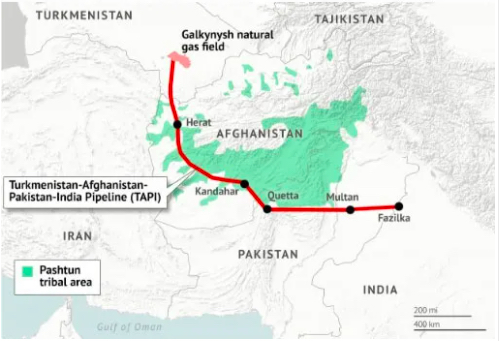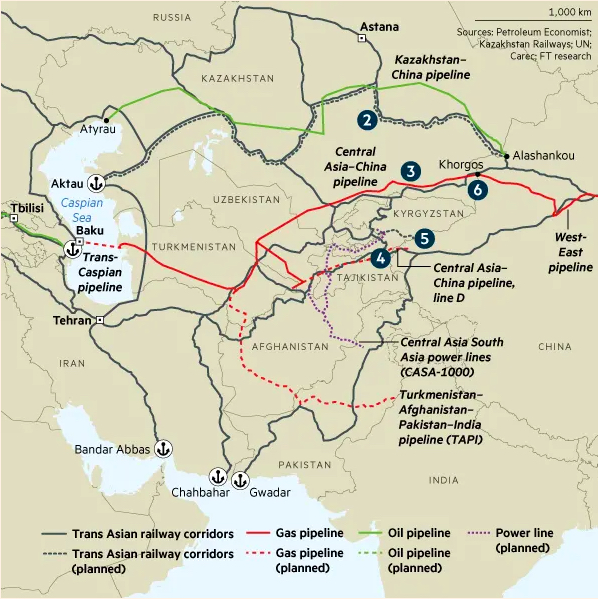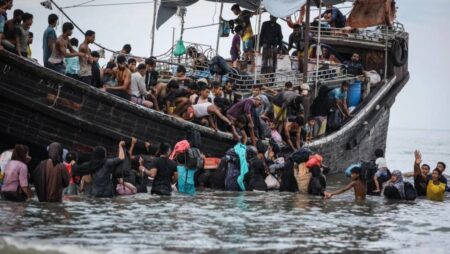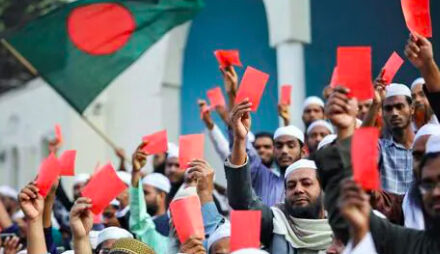MANTRAYA POLICY BRIEF#38: 08 APRIL 2022
Re-Reviving TAPI: Hardened Obstacles & Challenges for New Delhi
Bibhu Prasad Routray
Abstract
The TAPI project is in the news, yet again. There have been fresh attempts at reviving the project by all involved parties. The long-stalled project also seems to have been boosted by a China-led initiative. However, to imagine the project being up and running because of these expressions of interest are difficult. Almost all the obstacles that have prevented the project from fruition remain. Worse still, few of them have actually hardened, posing almost an insurmountable challenge to the implementation of the project. Time, therefore, is to bring in fresh and innovative thinking.
Introduction

Nearly 27 years back, a natural gas pipeline, Turkmenistan’s Galkynysh gas field, between Turkmenistan and Pakistan was conceived. By 1998, Afghanistan, the transit country, and by 2008, India, an additional end receiver of gas, had joined the project, making it the Turkmenistan Afghanistan Pakistan India (TAPI) pipeline project, to be laid over 1800 kilometres. However, over the decades, progress on the project has been bogged down by several factors. Construction in Turkmenistan is reportedly complete. Apart from that, very little has progressed on this US$9.6 billion project, which would carry 33 billion cubic metres (bcm) of gas a year. Whereas instability in Afghanistan is the primary impediment, difficulties in obtaining financing for the project and the state of relations between India and Pakistan too add to the complexity.
Fresh lease of life?
During his four-day visit to Turkmenistan, the first-ever by an Indian head of state, on 2 April, Indian President Ram Nath Kovind suggested that issues related to the security of the TAPI pipeline and key business principles may be addressed in technical and expert-level meetings. Kovind’s efforts, however, faced a reality check from India’s Ministry of External Affairs (MEA) itself. Prior to the visit, Sanjay Verma, Secretary (West) in the MEA, had told reporters in New Delhi that “it is a difficult neighbourhood if you look at the geography. So, in that sense, this itself was a task in negotiating the pipeline”. Earlier, Turkmen President, during the India-Central Asia summit in January 2022, had underlined the importance of TAPI and had called for its faster implementation.
Kovind’s statement about reviving TAPI came a day after the joint statement released at the ‘Third Foreign Ministers’ Meeting Among the Neighbouring Countries of Afghanistan’, held in Tunxi, in eastern China’s Anhui province on 1 April. Foreign ministers or high-level representatives from China, Iran, Pakistan, Russia, Tajikistan, Turkmenistan and Uzbekistan attended the meeting. The joint statement referred to Turkmenistan’s promotion of the implementation of TAPI, which will be supported by Islamabad. The move is part of China’s roadmap for the neighbouring countries to help the Taliban-led Afghanistan to start an economic recovery.
TAPC or TAPIC

The Chinese interest in TAPI dates back to August 2018. That month, a Pakistani official told Reuters that China is exploring building a spur from Pakistan’s territory after the operationalization of the TAPI project. Much of Turkmenistan’s natural gas already goes to China through the Central Asia-China (CAC) gas pipeline’s Line A, which was commissioned in 2009. Two other pipelines, also parts of the CAC, connect China with gas fields in Uzbekistan (Line B) and Kazakhstan (Line C). The proposed spur from Pakistan through the Karakoram range could act as an alternative to Beijing’s plans to build a fourth Turkmenistan to China pipeline (Line D), agreements for which had been signed with Uzbekistan, Tajikistan and Kyrgyzstan in September 2013. In 2017, however, the project was cancelled after construction was stalled in Uzbekistan and Kyrgyzstan. This explains Beijing’s interest in TAPI. Line D was expected to raise Turkmenistan’s gas export capacity to China from 55 bcm to 85 bcm per year.
A spur from TAPI would be comparatively easier and more cost-effective than building a pipeline through several Central Asian mountain ranges. China’s interest in being included in TAPI is, therefore, understandable. At one level, this can be interpreted as piggybacking or a backdoor entry strategy by Beijing to benefit from an existing project. On the other, China’s involvement can possibly infuse some amount of dynamism into the project that has struggled to take off. It needs mention that the 3666 kilometres-long Turkmenistan section of the CAC was built and commissioned in 28 months. Although China may be interested in building only the ‘spur’, its warm relations with both Pakistan and the Islamic Emirate in Afghanistan further incentivize the possibility of moving forward with the implementation of TAPI.
Construction on the project in Turkmenistan began in December 2015, work on the Afghan section began in February 2018, and work on the Pakistani section was planned to commence in December 2018. 617-kilometres of the pipeline will pass through Afghanistan’s Kandahar and Herat provinces. In November 2021, Pakistan’s Federal Minister for Economic Affairs Omar Ayub Khan said that the implementation of TAPI has been on hold due to the ‘situation’ in Afghanistan. Khan, however, promised, “After stabilizing the situation, we will be able to return to the issue of construction.” Taliban have extended their support to TAPI. In October 2021, acting foreign minister, Amir Khan Muttaki, assured, in the presence of Turkmen Foreign Minister Rashid Meredov, that work will resume. Construction work in Pakistan, where the pipeline will pass through Quetta and Multan, terminating in Fazilka, a district in Punjab (in Pakistan) located near the India-Pakistan border, is yet to be started.
Intent and Instability Paradigm
There is no dearth of intent as far as driving TAPI to fruition among the involved nations. Expressions of intent alone, however, may not be sufficient. Among all the four (or five) nations involved in the project, New Delhi’s concerns about the instability in Afghanistan are the highest. Not only that the security of the project in both Afghanistan and Pakistan are in question, but participation in the project may also actually mean directly dealing with, legitimizing and even indirectly funding the Taliban’s Islamic Emirate, which will naturally transform into a stakeholder and beneficiary of the project. These are deterring factors for India.
Among all the three countries, India belongs to the ‘user only’ category, whereas the rest three will rake in additional revenue benefits. New Delhi’s anxieties are also rooted in its vulnerability as the gas supply may be subjected to disruption, depending upon the state of Indo-Pakistan relations. The involvement of China and the reality of the Sino-Pakistan nexus may further add to such vulnerability. Not surprisingly, President Kovind underlined the need to address the ‘issues related to the security of the pipeline and key business principles’ in ‘Technical and Expert level meetings’.
Way Ahead
It is difficult, therefore, to conceive the fruition of TAPI, with India included in it, until a truly inclusive and representative government is installed in Kabul. Can that lead to the project going ahead with the exclusion of India, becomes a critical question. With the potential involvement of China and Beijing drawing a substantial amount of gas from the project, the economic viability of the project may not be in doubt. Therefore, India has to tread carefully on its TAPI policy, in spite of its reservations about the Taliban. Secondly, India’s ‘user-only’ vulnerability, however, can possibly be addressed if TAPI can be extended beyond India, to Bangladesh. Dhaka, in 2012, evinced interest in joining TAPI and has done so repeatedly ever since. Dhaka’s energy demand has skyrocketed over the years, forcing it to discover new gas fields or draw additional supply from neighbouring Myanmar. New Delhi’s promotion of Dhaka as an additional partner in TAPI would not only bring in extra revenue but may boost bilateral ties. Further, it may further secure the supply through Afghanistan and Pakistan from intentional disruptions.
(Dr. Bibhu Prasad Routray is the Director of Mantraya. This policy brief has been published as part of Mantraya’s ongoing “Regional Economic Cooperation and Connectivity in South Asia” project. All Mantraya publications are peer-reviewed.)
To read previous Mantraya Policy Briefs CLICK HERE


